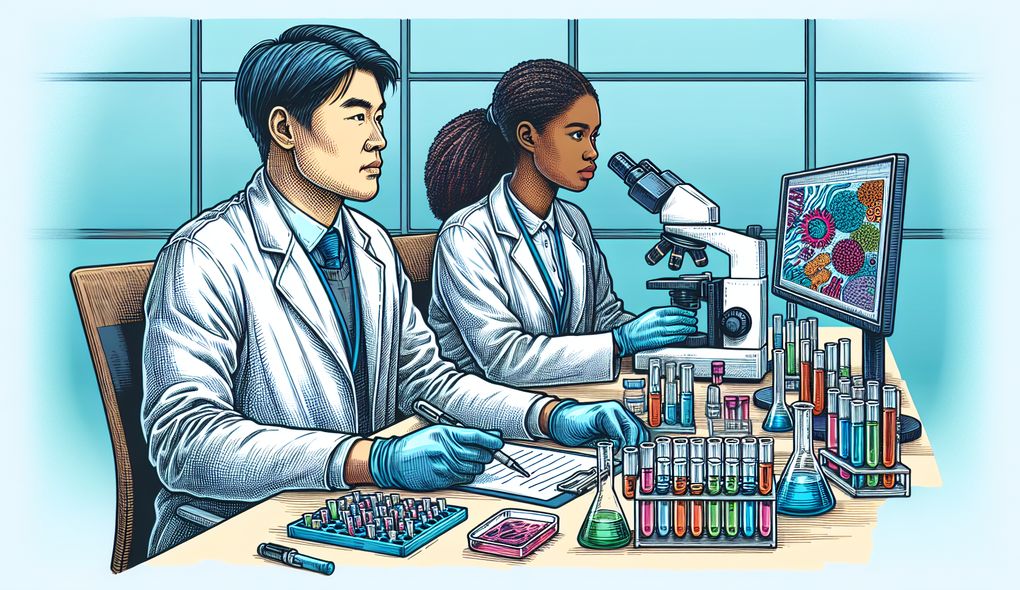Can you explain the importance of attention to detail in medical laboratory procedures?
JUNIOR LEVEL

Sample answer to the question:
Attention to detail is crucial in medical laboratory procedures because even the smallest errors can have serious consequences for patients. Inaccurate measurements or mislabeled samples can lead to incorrect diagnoses, delayed treatments, or even patient harm. For example, if a sample is mishandled and the test results are compromised, a patient with a serious condition may not receive the appropriate treatment in a timely manner. Additionally, attention to detail is important for maintaining accurate records and ensuring the integrity of the laboratory's data. By paying careful attention to every step of the laboratory process, we can ensure that patients receive the best possible care.
Here is a more solid answer:
Attention to detail is essential in medical laboratory procedures as even the smallest mistakes can have a significant impact on patient care. For instance, when conducting chemical analyses of body fluids, accurate measurements are crucial to detect abnormalities or diseases. A minor error in measurement could lead to a missed diagnosis or an incorrect medication dosage. Additionally, attention to detail is vital when entering data into the computer system to ensure accurate storage and retrieval of information. Moreover, maintaining accurate records is essential for monitoring patient progress and providing quality care. Overall, attention to detail is fundamental in medical laboratory procedures to ensure the reliability and precision of test results, which directly affect patient outcomes.
Why is this a more solid answer?
The solid answer provides a more comprehensive explanation of the importance of attention to detail in medical laboratory procedures. It includes specific examples of how errors can impact patient care and highlights the significance of accurate measurements, data entry, and record-keeping. However, it could further improve by incorporating the role of critical thinking in attention to detail, such as analyzing complex laboratory results and identifying potential errors or inconsistencies.
An example of a exceptional answer:
Attention to detail is paramount in medical laboratory procedures as it directly impacts patient safety and accurate diagnosis. Precise measurements and observations are essential to detect abnormalities or diseases in body fluids, aiding in the early detection and treatment of conditions. In addition, critical thinking plays a vital role in attention to detail, allowing laboratory technologists to identify potential errors or inconsistencies in test results. This involves analyzing complex data, comparing results with established norms, and investigating any variations. Moreover, attention to detail extends beyond testing procedures to include proper sample collection, labeling, and storage to prevent mix-ups or contamination. Diligently following standardized procedures and safety guidelines ensures the reliability and reproducibility of test results, leading to effective patient management and improved outcomes.
Why is this an exceptional answer?
The exceptional answer provides a comprehensive explanation of the importance of attention to detail in medical laboratory procedures. It highlights the direct impact on patient safety and accurate diagnosis, emphasizing the need for precise measurements, observations, and critical thinking. The answer also expands on the role of attention to detail in sample collection, labeling, and storage to prevent errors or contamination. The mention of standardized procedures and safety guidelines further reinforces the importance of attention to detail in maintaining reliable and reproducible test results. Overall, the exceptional answer addresses all the evaluation areas and provides a deep understanding of why attention to detail is crucial in the role of a Clinical Laboratory Technologist.
How to prepare for this question:
- Review the laboratory procedures and equipment commonly used in medical laboratories.
- Familiarize yourself with the potential consequences of errors in medical laboratory procedures.
- Develop strategies for double-checking measurements and ensuring accuracy in data entry.
- Practice analyzing complex laboratory results and identifying potential errors or inconsistencies.
- Keep up-to-date with the latest advancements and best practices in medical laboratory procedures.
What are interviewers evaluating with this question?
- Attention to Detail
- Critical Thinking

